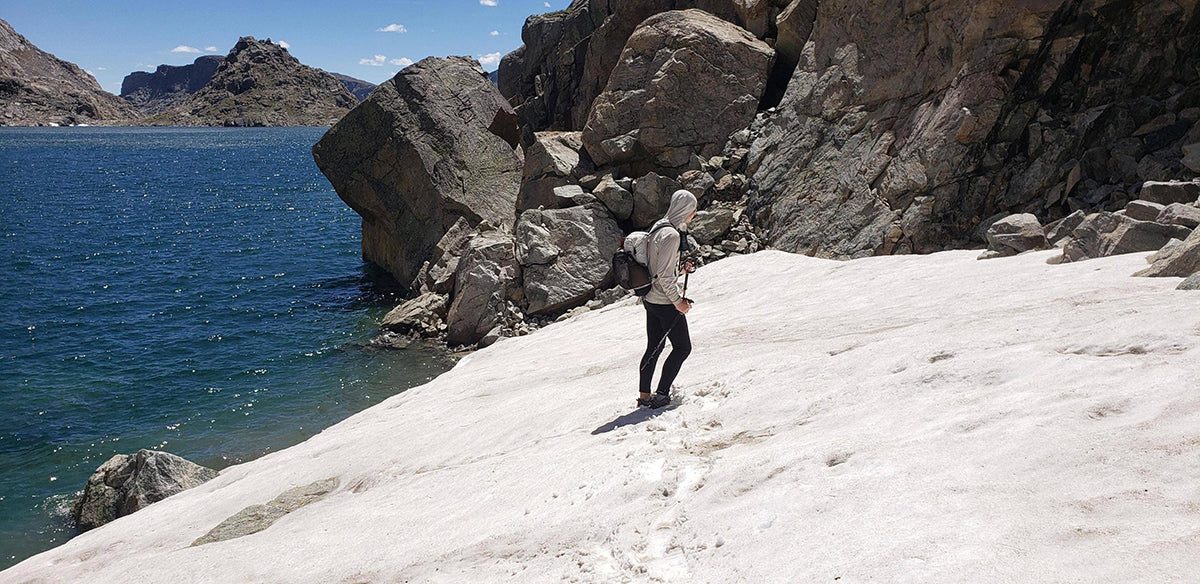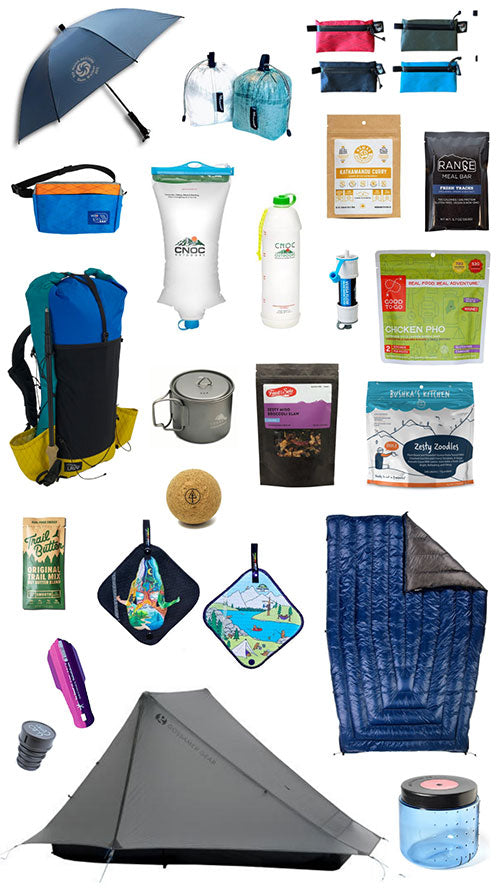 When you're in between a rock and a wet place ... My choices here were to get into the freezing alpine lake, or climb straight up a cliff. It would have been VERY nice to have the last item on this list …
When you're in between a rock and a wet place ... My choices here were to get into the freezing alpine lake, or climb straight up a cliff. It would have been VERY nice to have the last item on this list …
As the 2021 backpacking season for large parts of North America comes to a close, and with the holidays around the corner, many hikers are assessing how their gear performed this past year. We're asking ourselves questions like …
How can I improve my comfort on trail? How can I lower my baseweight? What's something new I can try?
Today, we answer all three questions. These five pieces of still somewhat-niche gear really are worth checking out. And … we predict it won’t be long before most backpackers and long-distance hikers have these … or at least know of them ... and are intrigued about the idea of adding them to their kit.
Trail Bidets

Conservation of the public lands we use to recreate on is of the utmost importance. However, beginner and experienced backpackers alike know all too well that toilet paper “blooms” can be found all along popular trails. They are usually the result of someone not packing out their used toilet paper, while simultaneously also not digging a properly sized cathole.

What if you could side step the toilet paper issue altogether? Enter the trail bidet.
Maintaining cleanliness is crucial to the long-term success of a thru-hike or backpacking trip, and a trail bidet can help you stay clean and chafe free ‘where the sun don’t shine’.
By using a high pressure water stream, the bidet is able to remove more fecal matter than traditional toilet paper, leaving you unsullied. The lack of residual particles diminishes the chance of friction, thus a diminished chance of chafing as well. Lastly, on a personal note, it just feels great.
Umbrellas

Going hands free with an umbrella. Notice the amount of sun coverage and ventilation.
Excuse me while I nerd out a bit, but umbrellas are so versatile! I’ve been using an umbrella for years, and they have saved me more times than I can remember.
Let's get the obvious out of the way; they help with rain. As a backpacker that runs hot and often backpacks in the desert southwest and humid southeast, wearing a rain jacket while moving can leave me drenched ... not from precipitation, but from perspiration. With an umbrella, you get the benefit of rain protection, while maximizing your ventilation.
Umbrellas are extremely versatile, as they’re also wonderful when the sun is beating down. Whether in the desert or on an exposed ridgeline, use your handy umbrella to shade and shield you from harmful UV rays.
Pro Tip: add shock cords to your shoulder straps to go hands free with your umbrella. If you have large lycra pockets on your shoulder straps, like those on the Nashville Cutaway, you can also go hands free by simply putting the handle and shaft of the umbrella in the pocket.

Top picture; going hands free while using one of the shoulder pockets of the Nashville Cutaway. Bottom picture; using the SMD Hands Free Kit to attach my umbrella to a traditional shoulder strap with a daisy chain.
Super Pro Tip: Go super ultralight with your shelter by using your umbrella as a frame for an Umbrella Bivy. All you need is a closed footbox on your quilt or sleeping bag, and a simple MYOG (Make Your Own Gear) bug net.
While an umbrella alone does work as a shelter — I once rode out a 50 mph wind and rain storm on the Pacific Crest Trail with an umbrella and the help of a small bush — if that's a little too hardcore, you can still use a flat tarp for your primary shelter, and then extend your protection from the elements with an umbrella.
In a half-mid pitch, place the umbrella in the door of your shelter. Coupled with good site selection, you can achieve full weather protection with this method.

Sun Gloves

During peak backpacking season, a hiker can be exposed to over 12 hours of sunlight. Although sunscreen provides some protection from the sun’s harmful UV rays, its effectiveness dwindles over the course of a day, meaning it has to be continuously reapplied, which can be cumbersome and time consuming.
Sunscreen is also a diminishing asset, needing to be purchased or picked up every few town stops. It’s no surprise why so many long-distance hikers and backpackers choose to wear button-up shirts or sun hoodies like those made by FarPointe and Voormi. Just put it on, and forget about the sun.
However, many of these shirts and sun hoodies, while protecting arms, fail to cover the back of our hands. Enter sun gloves. Sun gloves give you that much-needed coverage below your wrists, while still letting your digits breathe.
Sun gloves also add modularity to your clothing system. If you don't need the coverage, or your hands are running hot, you can simply pocket them!
Lastly, they can help with the rubbing and chafing that sometimes happens when using trekking poles.
Polartec Alpha Fleece

Polartec Alpha fabric has been around for a few years now, after first being developed for Special Operations units in the United States around 2012.
It wasn't introduced into the backpacking community until clothing manufacturers began to sell Polartec Alpha jackets in 2015.
Fast forward five years, when a small ultralight cottage company named Senchi Designs entered the fray with a line of Polartec Alpha hoodies, using it for the first time as a next-to-skin fabric.

Other brands have since started adopting the fabric into their own clothing designs and products. And it’s not surprising either. Polartec Alpha is ...
- Incredibly Lightweight. When compared to a traditional fleece of the same size, it often comes in at over half the weight.
- Packable! You can usually get it down to the size of a grapefruit.
- Highly breathable! The material has small pockets of lofty fleece to capture body heat and keep you warm while on the move, but the spaces in between are extremely permeable.
- Warm! Clothing made with Polartec Alpha can provide loads of warmth, but it’s definitely necessary to add a shell over the fleece to break the wind and trap your heat.
Packrafts

More than once, while out in the middle of secluded alpine basins, far from the nearest town, I've been sandwiched between a large lake and steep cliff sides. In those moments, I’ve wanted nothing more than my lightweight, inflatable packraft … to save myself from the exposed arduous climbing, instead paddling merrily past the rocky bands.
Circumventing obstacles in the backcountry by using waterways is just one way a packraft can make a tough situation easier. It can also be an amazing tool for exploration, and can mean that you begin to look at a map in a whole new way.

'Reverse portage' with a packraft. At the water’s edge, just keep going … and, hey, why don’t you sit down and take a load off too?!?
I got my first packraft right at the beginning of the pandemic, to give myself more opportunities to enjoy the outdoors. I lived in Central Texas at the time, and had more access to waterways than greenspaces. As a result, I was able to access some of the more elusive and beautiful parts of the state.
Please make sure to get appropriate levels of training for the difficulty of the water you’ll be paddling and also pack the necessary safety gear! The American Packrafting Association offers wonderful resources and you can support its efforts by joining for free.
What else would you add to this list of lightweight backpacking and thru-hiking gear about to go mainstream? Leave a comment below!
Rafael ”Horsecake” Mujica is a freelance writer and adventurer based in the Mountain West. You can find him trail running, backpacking, or sampling the best tacos during his free time. Follow all his adventures over on Instragam @horsecake22, or read more of his work over on his website.













